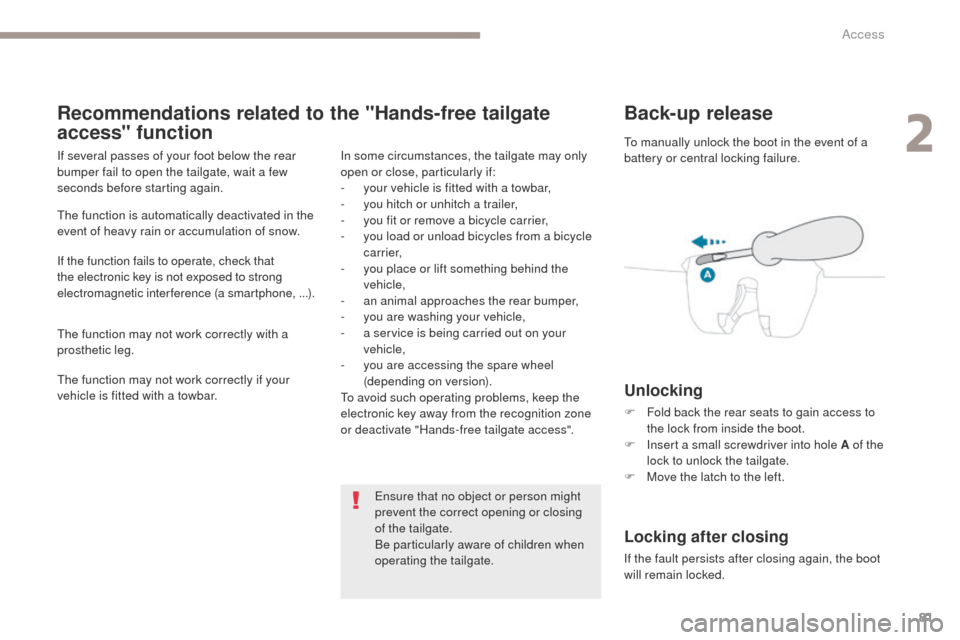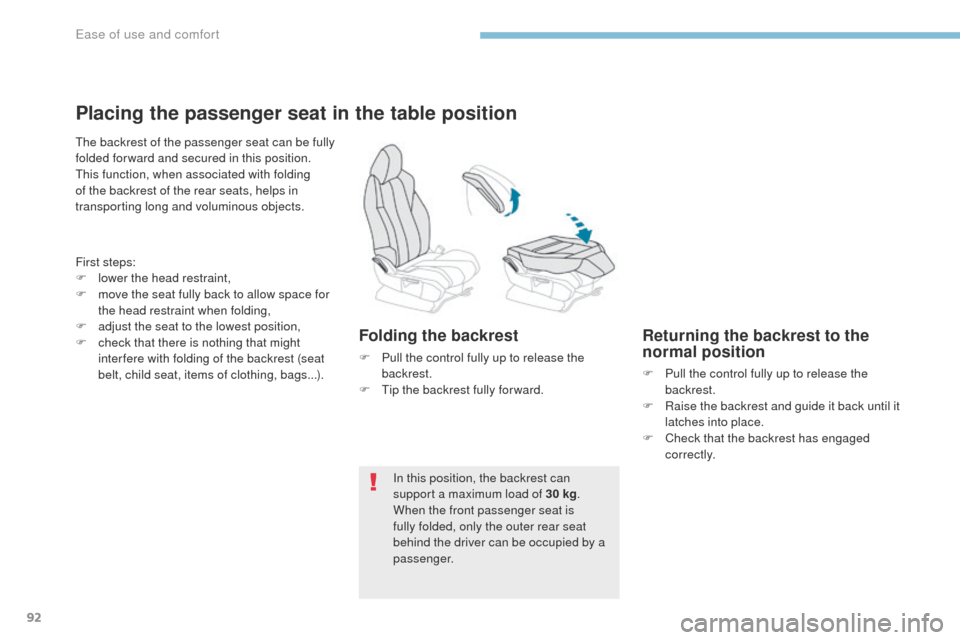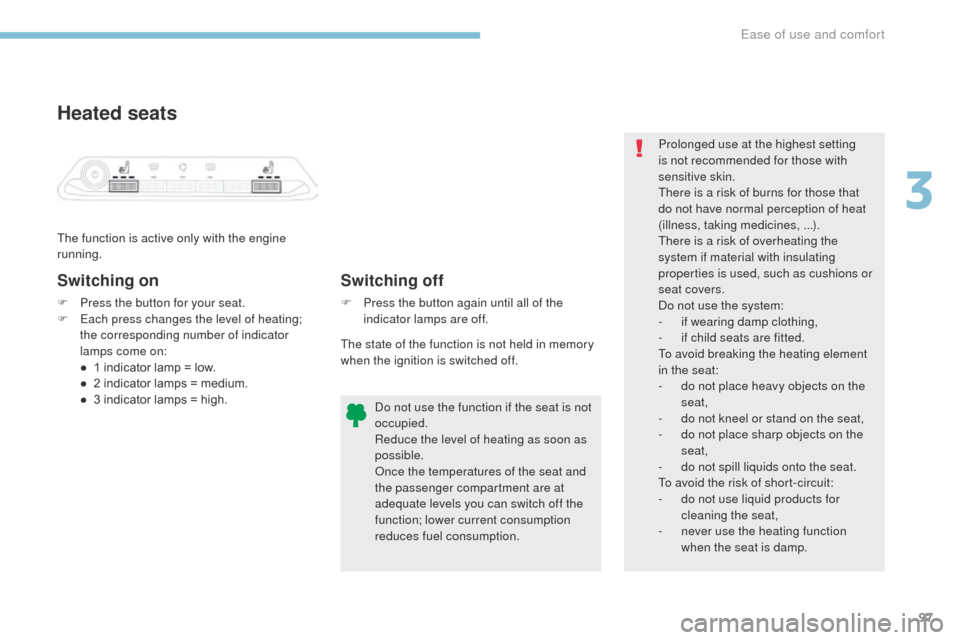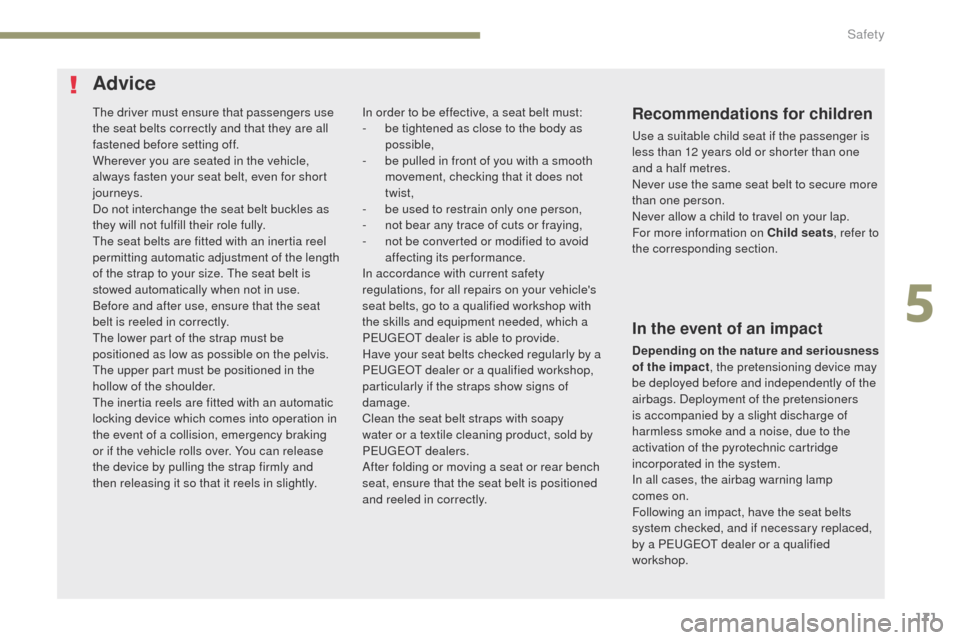2017 Peugeot 3008 Hybrid 4 child seat
[x] Cancel search: child seatPage 4 of 566

.
.
3008-2_en_Chap00a_sommaire_ed01-2016
Digital instrument panel 12
Indicator and warning lamps 1 6
Indicators
32
Manual test
4
0
Distance recorders
4
1
Lighting dimmer
4
2
Trip computer
4
3
Monochrome screen C
4
5
Touch screen
4
8
Remote control
5
4
Keyless Entry and Starting
5
8
Back-up procedures
6
4
Central locking
6
8
Alarm
70
D o o r s
74
Boot
7
5
Hands-free tailgate
7
6
Electric windows
8
2
Panoramic opening sunroof
8
4Driving position
8
8
Front seats
9
0
Steering wheel adjustment
9
9
Mirrors 99
i- Cockpit Amplify function
1
02
Heating and Ventilation
1
04
Manual air conditioning
1
06
Semi-automatic mono-zone air conditioning
1
08
Dual-zone automatic air conditioning 1 11
Front demist - defrost 1 16
Heated windscreen
1
17
Rear screen demist - defrost
1
18
Front fittings
1
19
Courtesy lamps
1
28
Interior mood lighting
1
29
Rear seats
1
30
Rear fittings
1
33
Boot fittings
1
35
Boot lamp
1
40Exterior lighting control stalk
1
41
Direction indicators
1
44
Headlamp beam height adjustment
1
45
Automatic illumination of headlamps
1
46
Automatic headlamp dipping
1
49
Cornering lighting
1
51
Wiper control stalk
1
52
Automatic rain sensitive wipers
1
55
General safety recommendations
1
56
Hazard warning lamps
1
57
Hor n
15
7
Emergency or assistance
1
58
Electronic stability programme (ESC)
1
60
Advanced Grip Control
1
64
Hill Assist Descent Control
1
66
Seat belts
1
68
Airbags
1
72
Child seats
1
77
Deactivating the passenger's front airbag
1
79
ISOFIX child seats
1
86
i-Size child seats
1
90
Child lock
1
93
Over view
Eco-driving
Instruments
Access Ease of use and comfort
Lighting and visibility
Safety
Contents
Page 8 of 566

6
3008-2_en_Chap00b_vue-ensemble_ed01-2016
Interior
Boot fittings 135 -140
- l oad space cover
-
1
2 V socket
-
b
oot lamp
-
a
djustable boot floor
-
l
ashing eyes
-
h
igh load retaining net
Warning triangle
3
07
Tools
309-311
Temporary puncture repair kit
3
12-316
Spare wheel
3
17-322
Child seats
1
77-192
ISOFIX mountings
1
86-189
i-Size child seats
1
90 -191A i r b a g s
172-176
Front seats
9
0 -97
Multipoint massage 9 8
Seat belts 1 68-171
Rear seats
1
30-132
Rear fittings
1
33-134
-
1
2 V socket
-
2
30 V / 50 Hz socket
-
r
ear armrest
-
sk
i flap Front fittings
1
19 -127
-
U
SB port
-
1
2 V socket
-
f
ront armrest
-
mats
Wireless charger
1
22-123
Scented air freshener
1
25-126
Glove box
1
20
Deactivating the passenger's front a i r b a g
17
4, 178 -181
Over view
Page 21 of 566

19
3008-2_en_Chap01_instruments-de-bord_ed01-2016
Warning / indicator lampStateCause Action / Observations
Passenger's
airbag system fixed in the seat belt
and passenger's front
airbag warning lamps
display. The control switch, located in the
glove box, has been placed in the
"ON"
position.
The passenger's front airbag is
activated. In this case, do not install a rear ward facing child seat
on this seat.
Move the control switch to the "OFF"
position to
deactivate the passenger's front airbag. In this case,
you can install a rear ward facing child seat, unless
there is a fault with the airbags (airbag warning
lamp
on).
Deactivation of
the automatic
functions of the
electric parking
brake
fixed.
The "automatic application" (on
switching off the engine) and
"automatic release" functions are
deactivated or faulty. Activate the function again or contact a PEUGEOT
dealer or a qualified workshop in the event of a fault.
For more information on the Electric parking brake
,
refer to the corresponding section.
Electric parking
brake
fixed.
The electric parking brake is applied. Release the parking brake to switch off the warning
lamp: with your foot on the brake pedal, briefly push
the parking brake control lever.
Observe the safety recommendations.
For more information on the Electric parking brake ,
refer to the corresponding section.
1
Instruments
Page 23 of 566

21
3008-2_en_Chap01_instruments-de-bord_ed01-2016
Warning / indicator lampStateCause Action / Observations
Stop & Star t fixed, accompanied
by the display of a
message. The Stop & Start system is
deactivated.
The engine will not cut out at the next stop in the
traffic.
Reactivate the system by pressing the button again.
For more information on Stop & Star t
, refer to the
corresponding section.
Passenger's
airbag system
fixed in the instrument
panel and/or seat belt
and front passenger's
airbag warning lamps
display. The control switch, located in the
glove box, is set to the OFF
position.
The passenger's front airbag is
deactivated. You can install a rear ward facing child seat, unless
there is a fault with the airbags (airbag warning lamp
o n).
Set the control to the "
ON" position to activate the
passenger's front airbag. In this case, do not install a
rearward facing child seat on this seat.
Deactivation indicator lamps
If one of the following indicator lamps comes on, this confirms that the corresponding system has been switched off intentionally.
This may be accompanied by the display of a message and an audible signal.
Distance aler t
/
Active Safety
Brake fixed, accompanied by
a message.
The system has been deactivated,
via the vehicle configuration menu in
the screen. For more information on the Distance alert
/ Active
Safety Brake system, refer to the corresponding
section.
Assisted Lane
Departure
Warning System fixed, accompanied
by the display of a
message. The system has been deactivated. There will be no correction of the vehicle's trajectory
should there be a change of direction.
For more information on the Assisted Lane
Departure Warning System, refer to the
corresponding section.
1
Instruments
Page 83 of 566

81
3008-2_en_Chap02_ouvertures_ed01-2016
Back-up release
Unlocking
F Fold back the rear seats to gain access to the lock from inside the boot.
F
I
nsert a small screwdriver into hole A of the
lock to unlock the tailgate.
F
M
ove the latch to the left.
Locking after closing
If the fault persists after closing again, the boot
will remain locked. To manually unlock the boot in the event of a
battery or central locking failure.
Recommendations related to the "Hands-free tailgate
access" function
If several passes of your foot below the rear
bumper fail to open the tailgate, wait a few
seconds before starting again.
The function is automatically deactivated in the
event of heavy rain or accumulation of snow.
If the function fails to operate, check that
the electronic key is not exposed to strong
electromagnetic interference (a smartphone, ...).
The function may not work correctly with a
prosthetic leg.
The function may not work correctly if your
vehicle is fitted with a towbar. In some circumstances, the tailgate may only
open or close, particularly if:
-
y
our vehicle is fitted with a towbar,
-
y
ou hitch or unhitch a trailer,
-
y
ou fit or remove a bicycle carrier,
-
y
ou load or unload bicycles from a bicycle
c a r r i e r,
-
y
ou place or lift something behind the
vehicle,
-
an
animal approaches the rear bumper,
-
y
ou are washing your vehicle,
-
a s
ervice is being carried out on your
vehicle,
-
y
ou are accessing the spare wheel
(depending on version).
To avoid such operating problems, keep the
electronic key away from the recognition zone
or deactivate "Hands-free tailgate access".
Ensure that no object or person might
prevent the correct opening or closing
of the tailgate.
Be particularly aware of children when
operating the tailgate.
2
Access
Page 94 of 566

92
3008-2_en_Chap03_ergonomie-et-confort_ed01-2016
Placing the passenger seat in the table position
The backrest of the passenger seat can be fully
folded for ward and secured in this position.
This function, when associated with folding
of the backrest of the rear seats, helps in
transporting long and voluminous objects.
First steps:
F
l
ower the head restraint,
F
m
ove the seat fully back to allow space for
the head restraint when folding,
F
a
djust the seat to the lowest position,
F
c
heck that there is nothing that might
inter fere with folding of the backrest (seat
belt, child seat, items of clothing, bags...).
Folding the backrest
F Pull the control fully up to release the backrest.
F
T
ip the backrest fully for ward.
In this position, the backrest can
support a maximum load of 30 kg .
When the front passenger seat is
fully folded, only the outer rear seat
behind the driver can be occupied by a
passenger.
Returning the backrest to the
normal position
F Pull the control fully up to release the backrest.
F
R
aise the backrest and guide it back until it
latches into place.
F
C
heck that the backrest has engaged
c o r r e c t l y.
Ease of use and comfort
Page 99 of 566

97
3008-2_en_Chap03_ergonomie-et-confort_ed01-2016
Heated seats
The function is active only with the engine
running.
Switching on
F Press the button for your seat.
F E ach press changes the level of heating;
the corresponding number of indicator
lamps come on:
●
1 i
ndicator lamp = low.
●
2 i
ndicator lamps = medium.
●
3 i
ndicator lamps = high. Do not use the function if the seat is not
occupied.
Reduce the level of heating as soon as
possible.
Once the temperatures of the seat and
the passenger compartment are at
adequate levels you can switch off the
function; lower current consumption
reduces fuel consumption.
Switching off
F Press the button again until all of the
indicator lamps are off.
The state of the function is not held in memory
when the ignition is switched off. Prolonged use at the highest setting
is not recommended for those with
sensitive skin.
There is a risk of burns for those that
do not have normal perception of heat
(illness, taking medicines, ...).
There is a risk of overheating the
system if material with insulating
properties is used, such as cushions or
seat covers.
Do not use the system:
-
i
f wearing damp clothing,
-
i
f child seats are fitted.
To avoid breaking the heating element
in the seat:
-
d
o not place heavy objects on the
seat,
-
d
o not kneel or stand on the seat,
-
d
o not place sharp objects on the
seat,
-
d
o not spill liquids onto the seat.
To avoid the risk of short-circuit:
-
d
o not use liquid products for
cleaning the seat,
-
n
ever use the heating function
when the seat is damp.
3
Ease of use and comfort
Page 173 of 566

171
3008-2_en_Chap05_securite_ed01-2016
The driver must ensure that passengers use
the seat belts correctly and that they are all
fastened before setting off.
Wherever you are seated in the vehicle,
always fasten your seat belt, even for short
journeys.
Do not interchange the seat belt buckles as
they will not fulfill their role fully.
The seat belts are fitted with an inertia reel
permitting automatic adjustment of the length
of the strap to your size. The seat belt is
stowed automatically when not in use.
Before and after use, ensure that the seat
belt is reeled in correctly.
The lower part of the strap must be
positioned as low as possible on the pelvis.
The upper part must be positioned in the
hollow of the shoulder.
The inertia reels are fitted with an automatic
locking device which comes into operation in
the event of a collision, emergency braking
or if the vehicle rolls over. You can release
the device by pulling the strap firmly and
then releasing it so that it reels in slightly.Recommendations for children
Use a suitable child seat if the passenger is
less than 12 years old or shorter than one
and a half metres.
Never use the same seat belt to secure more
than one person.
Never allow a child to travel on your lap.
For more information on Child seats, refer to
the corresponding section.
In the event of an impact
Depending on the nature and seriousness
of the impact , the pretensioning device may
be deployed before and independently of the
airbags. Deployment of the pretensioners
is accompanied by a slight discharge of
harmless smoke and a noise, due to the
activation of the pyrotechnic cartridge
incorporated in the system.
In all cases, the airbag warning lamp
comes
on.
Following an impact, have the seat belts
system checked, and if necessary replaced,
by a PEUGEOT dealer or a qualified
workshop.
Advice
In order to be effective, a seat belt must:
- b e tightened as close to the body as
possible,
-
b
e pulled in front of you with a smooth
movement, checking that it does not
twist,
-
b
e used to restrain only one person,
-
n
ot bear any trace of cuts or fraying,
-
n
ot be converted or modified to avoid
affecting its performance.
In accordance with current safety
regulations, for all repairs on your vehicle's
seat belts, go to a qualified workshop with
the skills and equipment needed, which a
PEUGEOT dealer is able to provide.
Have your seat belts checked regularly by a
PEUGEOT dealer or a qualified workshop,
particularly if the straps show signs of
damage.
Clean the seat belt straps with soapy
water or a textile cleaning product, sold by
PEUGEOT dealers.
After folding or moving a seat or rear bench
seat, ensure that the seat belt is positioned
and reeled in correctly.
5
Safety